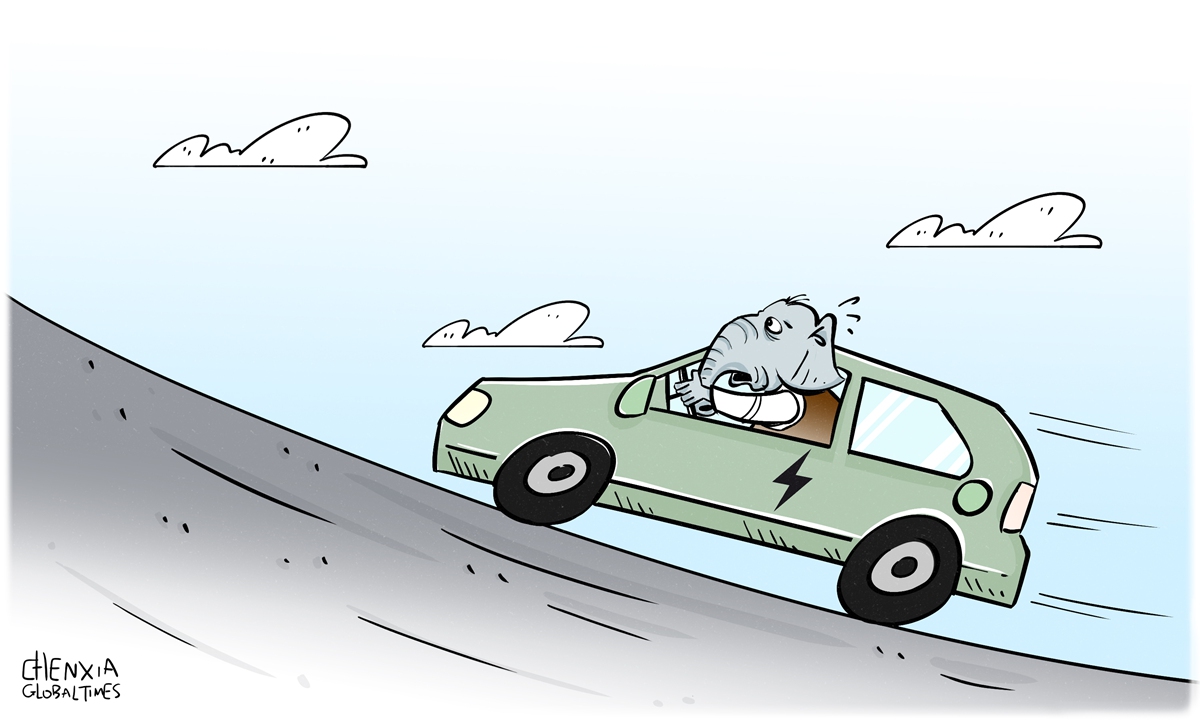
Illustration: Chen Xia/Global Times
Confirming earlier media reports about a planned visit to India, Tesla CEO Elon Musk wrote on X, formerly known as Twitter, on Thursday that he is looking forward to meeting Indian Prime Minister Narendra Modi in the country. No details were released, but media reports said that Musk may make an announcement on Tesla’s plan to open a new factory in India during his trip.
Musk has been trying to break into the Indian market for years, while the Indian government has been attempting to attract foreign electric vehicle (EV) brands to establish facilities in the country.
If Tesla’s long-awaited investment in an EV facility come to fruition, it will undoubtedly be good news for India and help boost EV production. The country has set ambitious targets, aiming to become a global leader in all sectors of the EV market by 2030.
However, it will not be an easy task, even with the support of Tesla. India’s EV industry is still at a nascent stage.
As for Tesla, which focuses mainly on the mid- and high-end sectors and mature markets, nobody knows if it will find success in India.
While India’s EV market is growing, its size is small. Some statistics showed EVs accounted for just 2.3 percent of total passenger vehicles sold in India in 2023.
A key barrier India faces for large-scale adoption of EVs is the absence of public charging infrastructure. EV charging stations are still heavily reliant on imports of electronic components and semiconductors. Besides, the country faces a number of challenges, such as streamlining the approval process for public charging infrastructure, and building charging stations in underdeveloped and rural areas.
To make matters worse, consumers face frequent power outages in some regions of India.
Reuters reported in September 2023 that India had stepped up the use of coal to generate electricity in a bid to stop outages caused by lower hydroelectricity output, as an increase in renewables was struggling to keep pace with record power demand.
However, India’s expansion of coal mines and plants may complicate its efforts to achieve ambitious climate goals. A power shortage is brewing in India, which will probably pose obstacles for the expansion of the country’s EV market.
The Hindu BusinessLine recently reported that Tesla is in talks with Reliance Industries to set up an EV manufacturing site in India through a joint venture.
If the report is true, then, after Tesla’s India-built EV becomes available in the country, a key issue will be whether India’s immature market can digest enough Tesla cars and allow the American manufacturer of electric automobiles to make profits in the South Asian country.
India’s supply chain is another major challenge for the EV industry. One of the biggest issues is the limited domestic production of core components like lithium-ion batteries for EV. India is starting relatively late in trying to create an indigenous EV supply chain.
India and Southeast Asian countries are competing to attract Tesla to set up EV manufacturing sites, according to Japanese media outlet Nikkei. It remains to be seen how significant India’s role will be in Tesla’s Asian strategy. Will India’s importance diminish due to the challenges facing it?
Given the complex economic landscape, India’s EV ambitions should, more realistically, be implemented step by step with patience and openness. In this process, it is advised that India consider strengthen cooperation with neighboring countries and promote manufacturing development with a more pragmatic attitude.
The author is a reporter with the Global Times. [email protected]



